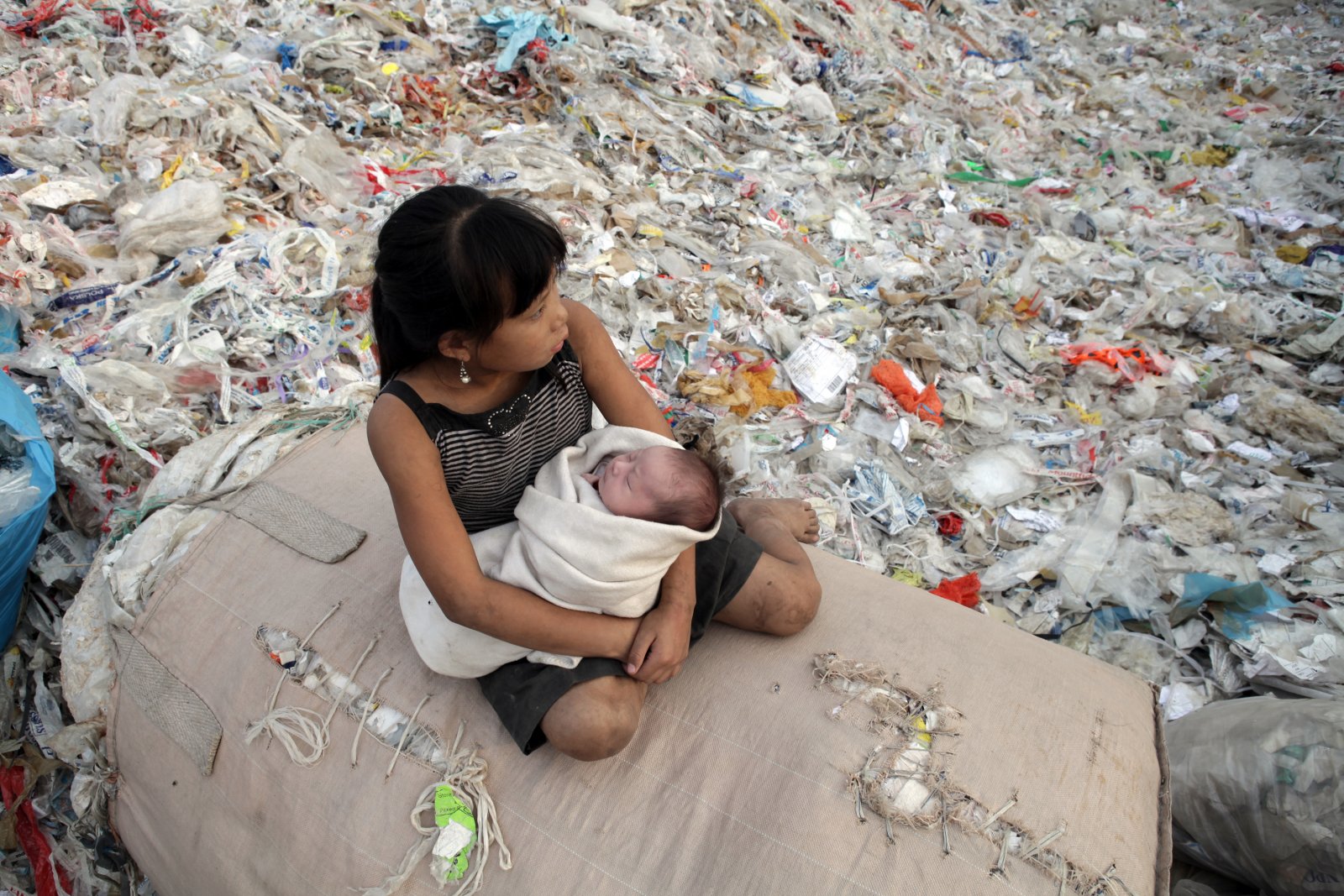How documentary “reFashioned” is taking on fashion waste in Hong Kong

A few minutes every morning is all you need.
Stay up to date on the world's Headlines and Human Stories. It's fun, it's factual, it's fluff-free.
Joanna Bowers’ film “reFashioned” follows three innovative entrepreneurs taking on the fashion industry’s waste production in Hong Kong. With landfills nearly at capacity and no option for waste exportation, the linear nature of fast fashion needs to move toward sustainable practices, including clothes recycling, upcycling and others.
According to a report by the United Nations (cited in the opening scenes of “reFashioned”), the fashion industry is responsible for 20% of global wastewater and 10% of global carbon emissions, which is more than international flights and maritime shipping. The UN predicts that if the industry continues these damaging practices, it could consume up to a quarter of the world’s carbon budget by 2050.
What kind of impact can a professor, a mother and tech company founder and a grassroots organization’s creator have on a culture skeptical of the efficacy of recycling and secondhand clothing? Joanna Bowers’ documentary threads these three narratives together amid the history of Hong Kong’s industrial era and the rapid traction of sustainable fashion. If the initiatives within “reFashioned” come to fruition, could Hong Kong’s economy catch a glimpse of circularity through the fashion industry?
The three protagonists of “reFashioned”

Edwin Keh and a group of scientists at The Hong Kong Research Institute of Textiles and Apparel (HKRITA) strive to make blended textiles recyclable for the first time with new technology. Keh’s alma mater, Whittier College, approached Bowers with his work.
“Once you start to look into this space and learn about supply chains and what goes into our clothes, it’s something you can’t unsee,” says Bowers. “Edwin is incredible, but I thought, am I making a commercial for Edwin, or am I making a documentary film? His story is amazing, but he’s at the macro level. He’s government-funded, he’s corporate-funded, he’s what you can do if you’ve got everything behind you. I need to expand the scope of this.”
Sarah Garner began her career as a fashion buyer, but her transition to motherhood triggered an epiphany. The effects of the fashion industry on the environment astonished her and motivated Garner to found Retykle, an online luxury resale platform. Retykle’s success relies on combating the stigma surrounding the use of secondhand material within a culture that believes clothing carries the luck of the previous owner.
“My initial reaction to [Retykle] was, ‘I don’t think my child needs to wear Gucci, even if it is secondhand and a bargain,’” admits Bowers. “But that was a very naive understanding of her business model. Once I understood the idea of buying better quality clothes and those clothes having multiple life spans, I totally got it and was on board. And also, she’s a female tech founder, she’s a mum; her story’s incredible.
“She literally was the face of high fashion. She was at runway shows in Paris and New York. She was that person who had that awakening when she had her children and thought, ‘Oh my God, what are we doing?’ The fact that she was so inspired to change, I thought that was really incredible.”
After stumbling upon Garner’s story, Bowers sought out a grassroots experience. Eric Swinton founded V Cycle, which targets the eradication of plastic pollution and aims to provide a fair wage for elderly waste pickers. V Cycle upcycles the plastic they collect into PET fabric. Upon the launch of a citywide campaign to collect as many plastic bottles as possible, Swinton relies on his Buddhist beliefs to confront various roadblocks to his goals, including financial troubles.
“[Swinton] hasn’t come from any background in sustainability,” says Bowers. “He came from a corporate gifting background, and the fact that he has worked so hard and put so much on the line for this thing that he believes in so passionately … We had to tell his story because he’s an amazing character, and I wanted to give him more exposure because I think that’s what he needs to achieve his goals.”
Why “reFashioned?”

Bowers has worn many hats within the film and television industry since her education in the United Kingdom. She began her career in Los Angeles but since 2009 has focused on directing throughout Asia for clients such as The North Face and HSBC. Her most recent work includes “The Helper,” a documentary film focused on the experience of Hong Kong’s migrant domestic workers, and “reFashioned.” Inspired by the three characters of Keh, Garner and Swinton, Bowers embarked on the project.
“I lived in LA for 11 years before coming to Hong Kong,” says Bowers. “You can get anything you want in LA, but Hong Kong is really quite specific. It feels like there’s a Louis Vuitton available at every corner. So there’s luxury available everywhere if that’s your budget, but beyond that, there’s not much midrange quality options. It’s either luxury or fast fashion.
“I come from a generation where I was the person where I couldn’t believe my luck when I found 10 dresses for under $100 at Forever21 before going to Coachella 15 years ago. I couldn’t see beyond that dress to see the impact that it was having in terms of supply chain and environmental consequences. My generation is totally culpable for fast fashion. We were the consumers, we were the ones that ate it up.”
The day they filmed at the landfill radicalized Bowers’ perspective. As consumers, we have the privilege to remove ourselves from the reality of our waste. We place it in the correct bin, and we congratulate ourselves on our effort. But to make a difference, we must reform and relearn our routines when it comes to waste.
“The smell of the place and the sheer scale…” Bowers pauses at the memory. “We had to send our drone 2.5 km out to sea to get a shot that was wide enough to show the landfill, and there’s four of those in Hong Kong.”
Since learning about the environmental impact of fast fashion, Bowers has fundamentally changed the way she consumes. She always thinks before she buys and encourages others to do the same. “One of my friends and colleagues came out of the film and said, ‘I will never shop the same way again,’” says Bowers. “That’s the crux of it. That’s the goal of the film.”
A circular economy

A circular economy designs out waste instead of producing it, like our current linear economy. “From the very beginning in the design process, you’re thinking ‘where does this go, and how is this material recaptured and reused?’” explains Bowers. “It’s a complete shift from the linear economy mindset in which we begin with virgin materials and all of it ends up dumped.”
You might shake your head at the seemingly improbable concept, but even brands largely responsible for the burden of fast fashion have begun to take steps toward sustainability. For example, H&M, one source of Keh’s funding, has implemented a used clothing collection system. Whatever you place in those boxes is reprocessed in a facility according to recyclables and items to be resold.
“When you see films like ‘Plastic China,’ you realize that [exporting waste] wasn’t a solution,” says Bowers. “Everyone needs to be responsible for their own recycling. We all need to find local solutions to our recycling issues. Everyone needs to get involved because recycling is largely not profitable. The cost of this process is going to have to be borne by governments and by the companies that create this product.”
Where do we go from here?
Step one: Watch “reFashioned.”
Step two: Realize your power as a consumer.
Step three: Make different choices.
“It’s completely true and completely valid to wonder if you as an individual can have an impact on such a monumental problem, but I think it’s when you bring all of these efforts together as a collective that it makes a big difference,” encourages Bowers.
Check out the website for updates on where you can watch “reFashioned.” If you’re reading from the United States or any location aside from Hong Kong, Bowers hopes the film eventually makes its way to a streaming service like Netflix.
Is your business doing something cool that you want to show off? Get in touch at hello@themilsource.com




Comments ()